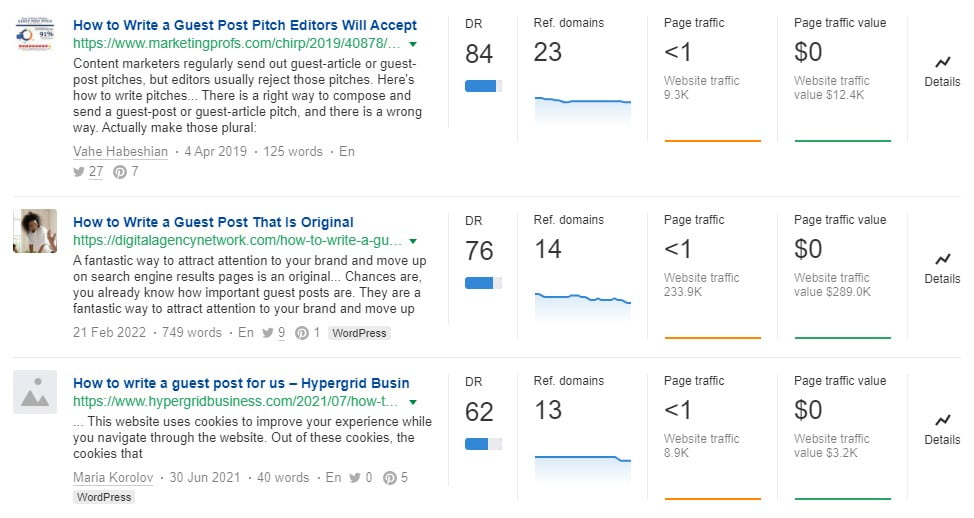If you’ve been in the SEO industry for a while, then you’ve probably heard of guest posting.
It’s a contentious topic.
Some say that link building is a thing of the past. Others claim it will make or break your SEO; they say you can’t rank without a solid guest posting strategy.
But before I get to that, I’m going to lay out what is guest posting:
A guest blog post is an article that you write for another website. Guest posting is the practice of reaching out to other websites and writing articles for them; by doing so, you build the backlink profile for your own site. Essentially, it’s the process of acquiring more outbound links that direct readers (and search engines) to your website.
In this article, I’m going to cover the ins and outs of guest posting and how you can use it to improve your SEO:
The Basics of Guest Posting
I’ll start by answering the first question on your mind: “Why should I write free content for someone else’s website instead of my own blog?”
Here’s why guest posting is so beneficial:
Consistently write high-quality content, and people will take notice. Each guest post adds another article to your repertoire. You’ll become a credible and reputable source in your industry, whether you specialize in lawn care or laser hair removal.
Boost your site traffic
Guest posting is an excellent way to direct new readers to your site. You can use guest posts to increase site traffic in a few ways:
- Readers from the guest post site. The site that posts your blog may already have an established readership. If those readers like your guest post, they might go on to check out your website.
- Social media shares. Draw traffic from Twitter, Facebook, or Instagram when the blog owners make social media posts promoting your article.
- Rank in organic search. Write an awesome article, and you could end up ranking on the first page of Google. You can then direct that organic traffic to your own site.
Build backlinks
Last and certainly not least, guest posting helps you acquire backlinks. With any post you write, it’s important to include a link to your own website. You might put it in the body of the article or your guest author bio. Be sure to add anchor text that includes one of your target keywords.
How To Find Guest Blogging Opportunities
The first step of guest posting is finding an opportunity. But not all sites offer equal benefits. When searching for guest posting opportunities, look out for these factors:
To see the benefits of guest posting, you need to choose sites with authority; those backlinks will be most valuable to you. You don’t want links from spammy, low-quality sites.
Think of it this way: Each backlink tells Google that another website trusts your own. If that link comes from a low-traffic site, the vote won’t count for much. But if that website gets thousands of visitors each month, it’s weighted more heavily.
How do you tell which sites are authoritative and which aren’t?
Domain Rating (a metric developed by Ahrefs) measures the authority of a website. The higher the rating, the more authoritative the site.
You can also look at Domain Authority, a similar scoring system developed by Moz.

Relevant content
Choose sites that are relevant to your industry. If you own a pet grooming business and you find a guest post opportunity for an IT support blog, you’re probably better off without it. It’s important to blog on relevant sites; that way, you’re attracting an audience that’s interested in your content. Doing so will also boost your authority for the associated keywords.
Active readers
Take a look at other posts on the guest blog. Are people engaging with the articles by liking, sharing, or commenting on them? Look for active websites where readers engage with posts.
Now, how do you find those golden backlink opportunities? There are a few ways to go about it:
Direct search
First, we can turn to our trusty friend Google. Start by searching for a keyword that’s relevant to your niche. It doesn’t need to be an exact match, but the closer it is, the better. Going back to my example of a pet grooming business, you could search for keywords like “pet care”, “animal grooming”, or “dog blog”.
Then, add any of the following tags to it:
- Write for us
- Guest posts
- Guest posting guidelines
- Seeking guest posts
- Accepting guest posts
- Submitting guest posts
If you’re looking to find a few guest post opportunities, this is probably the easiest way to go about it. However, it’s tough to scale up this method for larger campaigns. For that, you’ll need to use guest posting software (more on that later).
Check out your competitors & keywords
What makes your competitors rank above you? It might be due to their own guest posting strategy. Find out if they’ve written blogs for other websites; then, you’ll identify opportunities for yourself.
Here are a couple of ways to search for those backlinks:
Manual search
Open up Google, and type “link:backlink.io -”. Then, add the domain of your competitor and the words “guest post”. If your competitor was McNally Robinson, that would look like: “link:backlink.io -Mcnallyrobinson.com guest post”. This should pull up any guest posts your competitor has written.
Online tools
Using Ahrefs, you can see a complete backlink analysis of your competitor. Enter the URL into the Site Explorer tool. Navigate to the “Pages” section and then “Best by links”. Then, you can see all the backlinks of your competitor. Not all of these will be guest posting opportunities, so you’ll need to do some digging.
If you want to search for guest post opportunities by keyword, try Pitchbox. With this tool, you can add filters to refine your results; for example, set it to only show sites with 1k site visitors a month.

Using these tools, you can draft a comprehensive list of sites. You might find anywhere between 5 and 50 blogs to choose from! Refine your results by choosing sites with good authority, traffic, and relevance to your industry.
Now, it’s time to prepare your pitch:
Preparing To Pitch a Guest Blogging Post
Here’s something important to remember when you’re writing a pitch: That great website you found? Other people in your industry have probably found it, too. The site owner might get dozens of guest post pitches a day. If you want your email to stand out, you need to personalize it.
Ready to write your pitch? Guest blogging outreach can get complicated. Let’s start with the basics:
First, familiarize yourself with the other blogs on that site. Ask yourself questions like:
- What is the general tone?
- What sort of topics do they cover?
- Do the blogs aim to inform readers, entertain them, or persuade them to buy something?
- Who is their target audience?
These questions will help you determine the type of content the site is looking for. You’ll find more success with guest blogging if you match the tone of the site. I also recommend matching the format of your article to the existing posts on their site.
Next up—choosing a topic. Typically, I recommend selecting two or three topics; this gives the site owner a few options to choose from. Check out other blogging sites in your industry, and see which topics perform best. Then, look at the guest post site to ensure you don’t pitch a topic they’ve already written about.
Once you’ve found a few topics that are relevant to your industry, change up the headlines to make them unique. Show the website owner why your content is different from other articles online.
In your email, be sure to include your credentials; this shows you’re qualified to write about your industry. Link to other popular posts you’ve written, or talk about your personal experiences.
Finally, it’s time to personalize the pitch. Start by including the first name of the recipient at the beginning of your email. Then, talk about what drew you to their website. Do they offer educational content? Is there a specific post you liked? The more personal you can be, the better.
Do what you can to make your email look less like spam. Reference the day of the week, current events, or recent news in your industry.
Remember, this is your opportunity to show off your writing chops. You’ve only got one shot to win them over. Make it count.
Guest Posting Software
Writing a few personalized pitches is no biggie. But if you’re building links for a larger campaign, you might be looking for software to help you out.
Enter Pitchbox, one of the best tools for outreach in the industry. Automate the outreach process and analyze data from your campaigns. You can send emails to dozens of prospects in a flash. If you’ve got 2 pitches in the works, try A/B testing them, and see which gets a better response rate. Scale up your guest posting strategy with Pitchbox.
Best Time To Pitch a Guest Post Spot
Sometimes, you write a compelling, completely personalized pitch but get no response. It happens to the best of us.
Maybe you sent the email at the wrong time. You can’t always wait for the perfect opportunity, but you can keep your eyes open.
Look for these opportunities to help your pitch land. Send your pitch when the website…
- Posts guest content regularly
- Has a page that is titled “Accepting guest posts/Write for us”
- Mentions your business, products, or services
Basic Pitch Best Practices for Guest Posting
Whenever you’re writing a guest post, take note of these practices:
Follow the guidelines
Most guest blogging sites have instructions about how to format, research, and write content for them. Do your best to follow these guidelines to a T. If you send them something that’s far off from what they request, they might not respond. Be sure to brush up on the guidelines before you reach out.
Introduce yourself
Show site owners that you’re not just another link builder; you’re a real person! Build a relationship with the prospect by introducing yourself in the email.
Tell the recipient a bit about your business, what you like writing about, and how you came across their site. Put a bigger emphasis on your writing skills than your business. After all, you’re pitching an article, not your products/services.
Why choose you?
Do you have years of experience in your industry? Are you a seasoned writer? Have you written posts that have garnered thousands of readers? Use your strengths to your advantage. Tell the blog owner why they should accept your blog instead of the other guest posts they receive every day.
How Does Guest Blogging Impact SEO?
Now, let’s get into the question you’ve been waiting for: Will writing guest posts improve my SEO?
The answer: It depends.
It depends on how you approach guest blogging, specifically, the types of websites you go after. It’s easy to get backlinks from generic websites that post any guest post that comes their way, but you’ll see little (if any) benefit from it.
Instead, try to choose sites that are most relevant to your own. Provide them with high-quality content, and you’ll see better gains from your guest posting strategy.
Guest blogging is an essential part of any SEO strategy. Follow the strategies I’ve covered in this guide, and you’ll see the difference that guest posting makes in search engine optimization.

FAQ
Wrapping Up
Guest posting might seem intimidating at first. But once you get the hang of it, you’ll be off to the races. Refer to this guide to put together a winning guest blogging strategy. And who knows? Once you build enough links and your website starts ranking, you might get emails from other guest bloggers asking to write articles for your site. Follow this guide, and that day won’t be far off. Thanks for reading SerpFocus!



Leave a Reply
You must be logged in to post a comment.